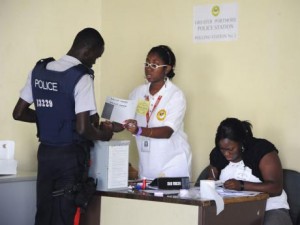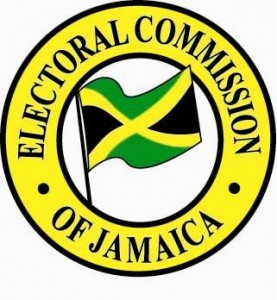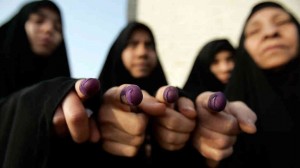
There is No Perfect System, But I’m Going to Exercise My Democratic Right
November 16th, 2016
It’s been quite a year for elections. Speaking for myself, I will be glad when it’s all over and done with.
Once our own General Elections were past, many Jamaicans (though not all) were already in the thrall of the exhausting slog of U.S. presidential elections. Jamaica’s campaign seemed like a quick sprint (or perhaps a 400 meter trot) compared to the American marathon. In the past week, since Mr. Donald Trump lumbered over the finish line, hair flying, it seems there has been no respite. I am left with a sour taste in my mouth and a strangely empty feeling (it’s almost a physical queasiness, certainly a mental one) – as if I had brought up the breakfast I just ate.
However one feels in the aftermath of Trump’s victory, here we are with our own local government elections on the horizon, and a televised debate scheduled for this evening. Last week I attended two very valuable morning training sessions for local media, conducted with great professionalism and attention to detail by the Electoral Office of Jamaica (EOJ). We were provided with a wealth of information on the “electoral machinery.” We discussed the rights and responsibilities of candidates, and what the voter should/should not be doing before, during or after Election Day. What qualifies a person to put himself forward as a councilor candidate, for example? What disqualifies someone? What about the complexities of the Portmore Municipal Council?
The journalists who were there (and unfortunately, by no means all media houses were represented) often seemed anxious to find fault and raise doubts. It was as if they were constantly holding the electoral system up to the light, like a mosquito net, scrutinizing it to see if there were any holes. Of course, this is what the media habitually does. It’s not a story, one journalist suggested, unless there is a problem. But of course, the Electoral Office will want exactly that to be the story, come Election Day: No problems.

A policeman getting advice on how to fold his ballot paper from an EOJ official during the 2011 general election. (Photo: Gleaner)
As the training continued, I tweeted a stream of information that I thought would be useful. I took a photo of a sample ballot and shared it, pointing out that one can mark one’s “X” on either side of the symbol, anywhere within the box that includes the candidate’s name and symbol. I thought this was pretty clear; but again, questions came up. The ballot is poorly designed. There should be another box to mark your “X” in. It is so confusing! Was the cry. I then recalled that this became a huge issue on social media during the February election. In endless tweets and posts, Jamaicans thoroughly confused themselves, and each other – casting doubt and concerns where there really did not need to be any. Having succeeded in doing this, quite a few Jamaicans then proceeded to berate the entire electoral system. It was unfair; it was prone to corruption; how can we trust it? People stuff ballot boxes! (No, they don’t). People have to stand in long lines! (Well, they do almost everywhere around the world). It’s dangerous! (Recent general elections have been quite peaceful on the day itself. Security is “tight”!) People vote more than once! (Not possible).
I have served as a volunteer election observer for Citizens’ Action for Free and Fair Elections (CAFFE), a serious and worthy organization, at Mountain View Avenue in Kingston, for three or four elections. It has been an eye-opening – and an increasingly encouraging – experience, especially when the electronic identification system was introduced. The voters themselves were impressed, and went away satisfied that they had expressed their democratic wish without fear or favor.

Teacher at Tarrant Primary School, Melissa Brown, leads students in a skit commemorating Universal Adult Suffrage. (Photo: Gleaner)
I am quite convinced, myself, that the ten year-old Electoral Commission of Jamaica (ECJ) – an independent, autonomous authority that reports directly to Parliament – has brought Jamaica a long, long way down the path to “free and fair elections.” It replaced the Electoral Advisory Committee (EAC) which was established in 1979, and progress has been steady. The EOJ, which conducted our training and administers all the day-to-day operations of the ECJ, is a public government agency established way back in 1943. It has evolved, the system has developed and improved. It has been a huge amount of work by dedicated individuals over the years, despite the occasional efforts of less altruistic Jamaicans to thwart it. Let’s give them a whole lot of credit for that. The ECJ works with the law, first and foremost.
One more thing: Jamaicans have complained bitterly about the many flaws in the U.S. election system – pointing, in particular, to the Electoral College (admittedly, a device that has long outlived its usefulness). Mr. Trump did not win the popular vote! It’s not fair! Well, our Westminster system also has little regard for the popular vote. In 2005, Tony Blair’s Labour Party won quite comfortably with 21.6% of the total electorate supporting it. Now, if you want a completely different way of choosing your political leaders, then proportional representation might be the answer to the purists’ prayers; but then again, that opens a whole new boxful of problems. Ask the Israelis.
Just to recap… What are “free and fair elections”? As defined by the United Nations, the Principles of Universal Adult Suffrage are:
The Vote is Universal: All citizens who meet the qualifications established by law have the right to vote.
The Vote is Free: The elector is entitled to vote free from pressure or duress.
The Vote is Secret: The process guarantees not to publicize the preference or will of each elector.
The Vote is Direct: The citizen elects the representatives of his/her choice.
The Vote is Personal: The elector shall attend in person at his/her designated polling station.
The Vote is Non-Transferable: The elector cannot transfer to anyone his/her right to vote.
So there you have it. Now the only thing left to say is that I really do hope that Jamaicans will come out in their numbers to vote in the upcoming election. If you have never done so before – it’s a good feeling, despite the slight and temporary inconvenience of a deeply purple index finger.
It’s our right. I intend to exercise mine.
If you have any questions or concerns, contact the EOJ toll-free: 1-888-991-8683. Email: eojinfo@eoj.com.jm. Website: www.ecj.com.jm You will also find them on Facebook (Facebook.com/electionsja) and on Twitter @ecjamaica
If you would like to volunteer as a CAFFE observer in the upcoming election, you may contact them at caffeja@gmail.com. Toll-free: 1-888-GO-CAFFE or 770-2155. Their office is at 2 Fagan Avenue, Kingston 8.
Tags: CAFFE, Citizens' Action for Free and Fair Elections, Donald Trump, election observer, elections, Electoral College, Electoral Commission of Jamaica, Electoral Office of Jamaica, Jamaica, journalism, local government elections, politicians, Technology, Tony Blair, training, United Nations, United States, Universal Adult Suffrage, voting, Westminster system
The Gleaner reserves the right not to publish comments that may be deemed libelous, derogatory or indecent.
To respond to The Gleaner please use the feedback form.
- We Are the Zoomers
- Living Online with Humans and Birds: NAOC 2020
- Human Trafficking and the Problem of Public Education
- Down Memory Lane
- Are We Ready to Recover from COVID-19?
- Road Safety Matters: Is Your Vehicle Safe?
- Sexual Harassment, Me Too, and the Minister’s Disturbing Giggle
- The Vulnerable Senior Citizens, Private Care Homes and COVID-19
- A Muddle Over Masks
- Here is Something Life-Saving You Can Do: Give Blood!




